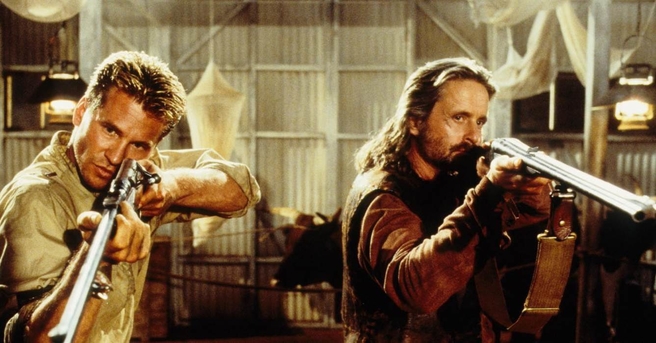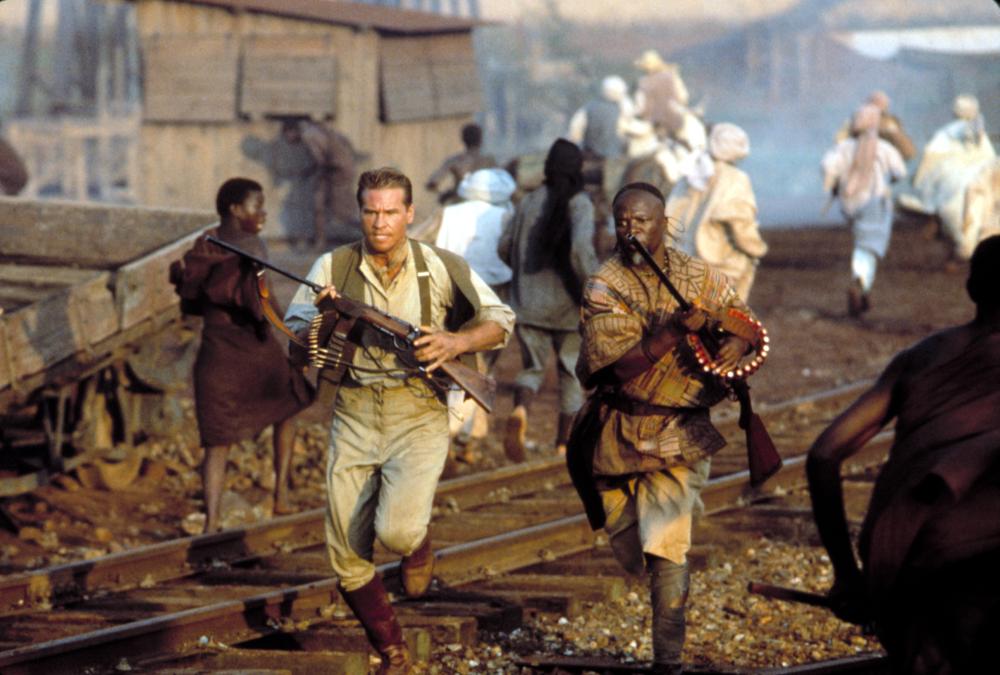The Ghost and the Darkness (1996)
DIRECTOR: Stephen Hopkins
CAST: Michael Douglas, Val Kilmer, John Kani, Brian McCardie, Bernard Hill, Om Puri, Tom Wilkinson, Emily Mortimer
REVIEW:
 The Ghost and the Darkness is obviously an attempt to do for the African tall grass what Jaws did for the water, with two lions in place of a great white shark, but it falls far short of Jaws’ classic status for a few reasons. One, director Stephen Hopkins is no Steven Spielberg. Two, Michael Douglas and Val Kilmer are not playing characters nearly as well-delineated as those played by Roy Scheider, Richard Dreyfuss, and Robert Shaw. Prolific author and screenwriter William Goldman (who’s written titles as diverse as The Princess Bride, Marathon Man, All the President’s Men, and Butch Cassidy and the Sundance Kid) does not churn out one of his stronger works. As an example of the general level of subtlety, the big game hunter is named Remington, and it’s the kind of movie where people say painfully earnest wannabe profundities like “you build bridges. You have to go where the rivers are”.
The Ghost and the Darkness is obviously an attempt to do for the African tall grass what Jaws did for the water, with two lions in place of a great white shark, but it falls far short of Jaws’ classic status for a few reasons. One, director Stephen Hopkins is no Steven Spielberg. Two, Michael Douglas and Val Kilmer are not playing characters nearly as well-delineated as those played by Roy Scheider, Richard Dreyfuss, and Robert Shaw. Prolific author and screenwriter William Goldman (who’s written titles as diverse as The Princess Bride, Marathon Man, All the President’s Men, and Butch Cassidy and the Sundance Kid) does not churn out one of his stronger works. As an example of the general level of subtlety, the big game hunter is named Remington, and it’s the kind of movie where people say painfully earnest wannabe profundities like “you build bridges. You have to go where the rivers are”.
The movie is (loosely) based on a true incident wherein a pair of man-eating lions went on a killing spree preying on construction workers building the Kenya-Uganda Railway over the Tsavo River in Kenya in 1898. Irish-born British soldier and engineer Colonel John Patterson (Val Kilmer) is appointed by ambitious tycoon Beaumont (Tom Wilkinson) to supervise construction of a railway bridge in Kenya to beat the Germans and the French to completion and preserve the British Empire’s dominance of the African continent. Almost immediately after his arrival, a pair of male lions begin a rampage, dragging the Indian and African workers from their tents in the dead of night and devouring them in the tall grass surrounding the camp, and also, unusually, making brazen attacks in broad daylight. The stoic Patterson vows to “sort it out”, but when his tree-top vigils, traps, and hired mercenaries prove ineffectual, Beaumont enlists the aid of famed big game hunter Charles Remington (Michael Douglas, doing more chewing on the scenery than the lions do on the extras) to end the lions’ reign of terror. But as always in these kinds of movies, the two hunters may become the hunted.
Despite John Kani’s portentous narration informing us from the get-go that “even the most unbelievable parts of this story really happened”, The Ghost and the Darkness takes its share of liberties with the historical record. There really was a pair of man-eating lions who went on a killing spree of railway workers over the span of several months, and were eventually dispatched by Colonel John Patterson, but the entire character of “Charles Remington” is fictional (as is his killing of one of the lions; in real life, Patterson killed both himself). Much is made of the lions being quasi-supernatural forces (“They were evil”, John Kani solemnly intones) who rack up a massive kill count seemingly for the fun of it, even making themselves an evil lair in a dark cave piled with skeletons, but many historians believe the kill count of allegedly 140 victims was trumped up by Patterson himself (along with various other details) to make himself look like more of a bad-ass for taking them down. In reality, disease had decimated the local prey animal population, and a cholera outbreak among the railway workers had resulted in many bodies buried in easily-unearthed shallow graves, giving the lions their likely first taste of human flesh. Additionally, later examination revealed at least one of the lions was suffering from dental disease (man-eaters are often elderly, lame, or with weak or missing teeth, making it difficult for them to bring down their natural prey), making their behavior not as inexplicable as the movie takes great pains to convince us it is.
It’s a little unfair to judge a movie solely for playing fast and loose with its “based on a true story” claims; after all, movies that do so are a dime a dozen, but The Ghost and the Darkness feels a little flimsy on its own merits. The movie can’t seem to make up its mind whether it wants them to be “only lions”, or vaguely non-committally float the idea of them being “more”, with the result that it just feels wishy-washy. The various ineffectual attempts to kill the lions, with Patterson bumbling around in the woods and suffering cliche-ridden mishaps like a misfiring gun, are muddled, including a sequence where Patterson gets knocked off a rickety man-made perch (and conveniently straight into the lion’s path) by a plot device of an aggressive owl (!).
Though Michael Douglas is first-billed (surely not owing anything to his also being a producer), his role is a supporting one and he doesn’t show up until forty-five minutes into the movie, looking like he stepped out of Romancing the Stone and loudly spouting one-liners like “do I have your attention?”. The filmmakers clearly aim for Remington to be this movie’s answer to Jaws’ Quint, but he doesn’t achieve the same effect; Quint had the sinking of the Indianapolis monologue to reveal unexpected depth. Half-hearted attempts are made at giving Remington a troubled backstory, but it’s not developed enough to mean anything, and Remington never rises above a campy movie character who knows he’s a campy movie character. Also, as perfectly-cast as Michael Douglas might be as a sleazy business tycoon, that’s how miscast he feels as a grizzled big game hunter. Val Kilmer’s stoically earnest Patterson rather hilariously sports spiked blond highlights that seem less than period accurate, and a half-assed attempt at an Irish accent that basically disappears after a while (Douglas makes an equally half-hearted attempt at a Southern one). Patterson is firmly in the “white savior” category, marching manfully into the fields to straighten things out whilst the poor helpless natives flee (at least those not serving as monster fodder). The only non-white man in the movie (besides Om Puri’s Abdullah, who verges close to a negative Muslim stereotype) who is more than an interchangeable extra is John Kani’s Samuel, and he’s relegated firmly to being the white heroes’ sidekick (along with getting some heavy-handed narration). In smaller roles we have Brian McCardie, basically playing the same character he played in 1995’s Rob Roy (a chipper but ill-fated sidekick), Bernard Hill as the curmudgeonly camp doctor, Tom Wilkinson, spending a couple of scenes chomping on scenery and twirling his mustache as the ridiculously one-note Beaumont, who snarls lines like “I don’t care about you, and I don’t care about your thirty dead, I care about my knighthood!” (if that’s not spelling out your entire characterization with the subtlety of a sledgehammer, I don’t know what is), and Emily Mortimer in the thankless role of “the wife”.
The movie has effective elements. Jerry Goldsmith provides a stirring African-flavored score (though the ominous “ba ba baaaaa” heralding the lions’ arrival does not exactly achieve the same effect as John Williams’ theme for the shark in Jaws), and prominent cinematographer Vilmos Zsigmond provides some picturesque shots that look borrowed from a Nature Channel documentary. Several shots of barely-visible glimpses of the lions stalking through the tall grass are effectively creepy, as is a sequence in which Patterson and Remington try to lure the beasts into a blood-splattered warehouse. The lions themselves are an effective (for the most part) combination of predominantly real lions with a smattering of CGI and animatronics. The two final confrontations with each lion may spark a momentary adrenaline rush (though the second at least is a tad unlikely, with Patterson conveniently managing to stay just ahead of a sprinting lion down a length of bridge). But try as it might, this rather campy African adventure, while an entertaining enough diversion, is not likely to reach Jaws‘ enduring status.
* * 1/2
